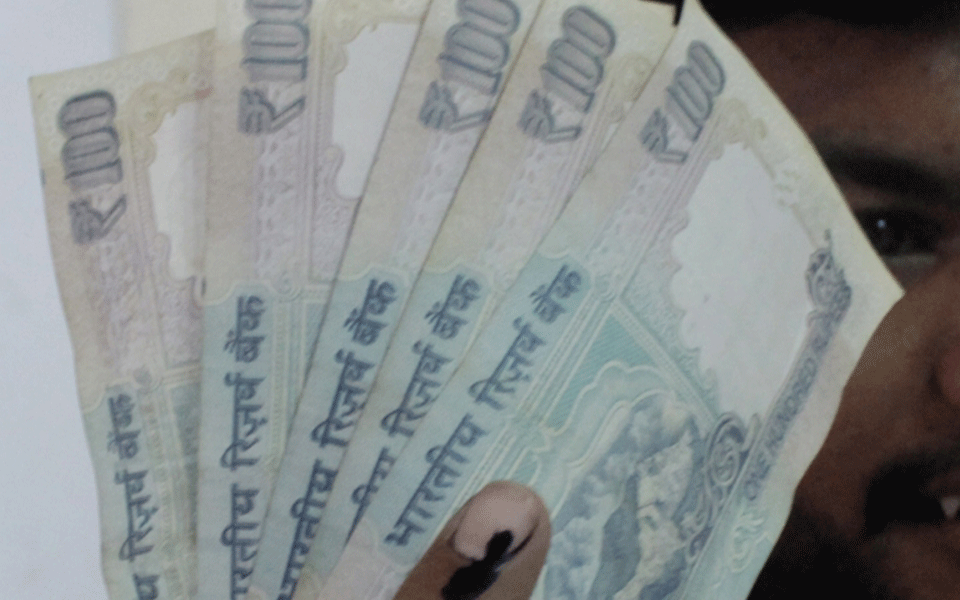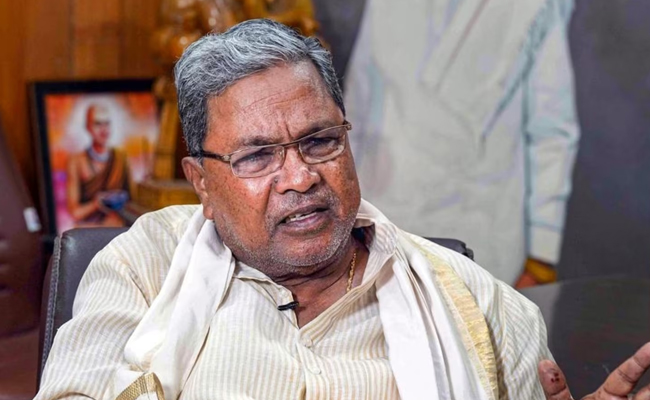New Delhi, Aug 21 : Repayment of funds, which was raised from overseas market in 2013, has been a main reason for rupee depreciation in the past few months, a senior Finance Ministry official said on Tuesday.
However, the official maintained that there has been a "zero depreciation" of the Indian currency in the last 5-years between 2013 and 2018.
"In 2013, about $32-34 billion were raised by the government that appreciated the Indian rupee," the senior official said here on Tuesday adding that "the currency exchange rate between the US dollar and the Indian rupee pair is the same in 2018 as it was in 2013."
"In the last 5-years, the Indian rupee has remained stable against all major currencies like Euro and Pound, though vis-a-vis the US dollar there has been some depreciation due to the strengthening of the USD."
"We are the only country among the emerging market economies, whose currency has maintained a stable value in the long term."
In recent days, factors such as geo-political developments, wider trade deficit, along with outflow of foreign funds have pulled the Indian rupee to fresh record intra-day and closing lows.
On august 16, the Indian rupee had plunged to an intra-day low level of 70.39-40 -- its lowest ever mark -- against the greenback prompting automobile manufacturers and other import dependent sectors to raise prices.
It settled at a record closing low of 70.16 against the US dollar on August 16.
However, easing of global trade tensions, the Indian rupee appreciated by 2 paise on Tuesday to settle at 69.81 per US dollar, from 69.83 on the previous trade session.
On the country's foreign reserves position, the official said: "We are in a comfortable position as far as the forex reserves are concerned."
Recently, the country's foreign reserves as handled by the Reserve Bank of India declined by over $1.80 billion during the week ended August 10 to $400.88 billion from $402.70 billion reported for the week ended August 3.
Analysts attributed the decline in Forex reserves to RBI's intervention to stem the decline in rupee's fall. The RBI is known to enter the markets via intermediaries to either sell or buy US dollars to keep the rupee in a stable orbit.
Let the Truth be known. If you read VB and like VB, please be a VB Supporter and Help us deliver the Truth to one and all.
Bengaluru (PTI): Karnataka Chief Minister Siddaramaiah has echoed Congress leader Rahul Gandhi’s allegations of large-scale electoral misconduct by the BJP, accusing the ruling party at the Centre of manipulating voter lists and undermining democratic institutions, including the Election Commission of India.
In an interview with PTI Videos, Siddaramaiah said Rahul Gandhi was telling the truth when he alleged that genuine voters were being removed from electoral rolls while fake names were being added.
"Such things have happened in Maharashtra, Haryana, and Karnataka," he claimed and expressed his apprehension, "they are planning to do it in Bihar also".
The Chief Minister accused the BJP of mischief and alleged that this manipulation was happening across the country.
He came down heavily on the Election Commission, saying it is no longer functioning as an independent constitutional body.
"The Election Commission is working under the direction of the central government. It’s not independent. Election Commission has to function independently and fairly, but it is not doing so," the Chief Minister said.
Declaring that democracy is under threat, Siddaramaiah announced that the Congress would launch a nationwide campaign to expose these alleged irregularities and demand reforms to protect the integrity of the electoral process.
Siddaramaiah also reiterated the importance of conducting a nationwide caste census.
"Every state should start conducting the caste census. It should be socio-economic, educational, employment-based, and political. Because everybody should know, after independence, what is the status of an individual — economically, politically — and whether independence has reached everyone or not, whether equality has come or not," CM has insisted.
The purpose of the Constitution is to bring about change and remove inequality, he underlined.
He also clarified that he is not the convenor of the OBC advisory committee but only a member under Anil Jaihind’s leadership.
Regarding Karnataka’s own caste census, he said that authorities have been given a three-month time to complete the process and expressed hope that they will meet the deadline.
Regarding the alleged site allotment scam in Mysuru Urban Development Authority (MUDA), Siddaramaiah said, "It is a false case. They torture me, my wife, and my family unnecessarily. Though this does not come under the PMLA Act — there is no money laundering — unnecessarily, they harassed me and my family," he complained.
Welcoming the Supreme Court’s strong remarks, CM said, "It looks like the court has rightly said that if you want to do politics, do it in elections, not here. Not in this case, not through the ED. This is the warning of the Chief Justice of the Supreme Court to the BJP," Siddaramaiah said.
Speaking on the June 4 stadium stampede that killed 11 people, Siddaramaiah said the Cabinet has accepted the enquiry report submitted by retired High Court judge Justice Michael D’Cunha.
"Criminal cases have already been registered against the officials of Karnataka State Cricket Association (KSCA), Royal Challengers Bangalore (RCB) and DNA (the event management agency), apart from police personnel," he said.
"Additionally, an inquiry will be conducted against the police officers concerned," he added.





